Oatmeal: How to Feed This Food Safely to Your Baby
- Why oatmeal is a more preferable starter cereal for babies over rice cereal
- How iron levels differ in oatmeal types, and why “baby oatmeal” isn’t necessary
- Which type of instant oatmeal has surprisingly more iron than other oats
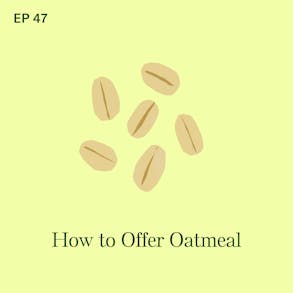
LISTEN TO THIS EPISODE
Episode Description
Oatmeal is a warm, familiar food, but what’s the best way to introduce oatmeal to your baby? In this episode, I’m breaking down how to safely serve oatmeal so your baby can self-feed from the start. We’re talking about which types of oatmeal to use (and which to skip), how to cook it for the right texture, and why you don’t need to buy baby-specific oatmeal to get enough iron. Plus, I’ll show you how to keep the self-feeding principles of baby-led weaning, even with puree-textured foods like oatmeal.

Links from this Episode
- Baby-Led Weaning with Katie Ferraro program with the 100 First Foods™ Daily Meal Plan, join here: https://babyledweaning.co/program
- Baby-Led Weaning for Beginners free online workshop with 100 First Foods™ list to all attendees, register here: https://babyledweaning.co/baby-led-weaning-for-beginners
Other Episodes Related to this Topic

Latest Episodes

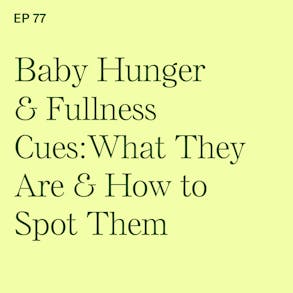
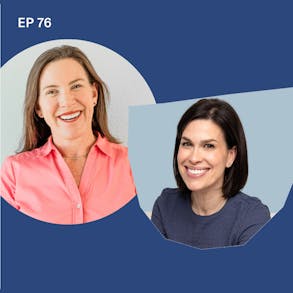
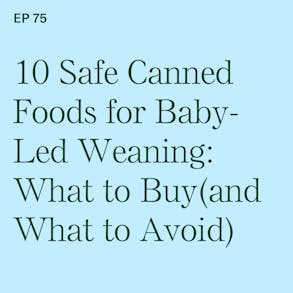
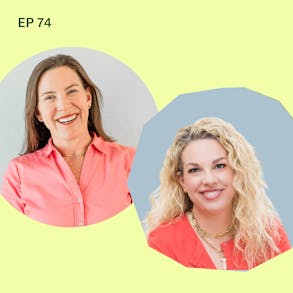
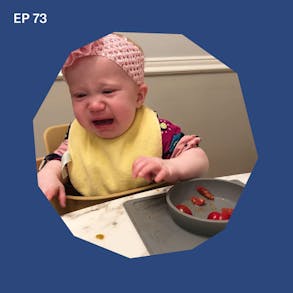
Rula (0s):
As a kid, I loved summer, but as an adult, I will readily admit Summer kind of stresses me out. There is no real schedule or real structure. My kids are home 24/7, and although I love that, I also struggle with finding time to work. We all know that periods of burnout or stress or anxiety can take a toll on your mental health. And while high quality therapy can certainly help with stressful situations, finding a provider that your insurance actually pays for is a challenge. RULA is changing the game though when it comes to finding the right therapist for you. That's in network and covered care for most major insurance providers, right? Because you've probably used your insurance to cover your physical health. So why shouldn't it also cover your mental health? RULA makes sure it does, and RULA does things differently. So they partner with over 100 insurance plans making the average copay just about $15 per session. So that's real therapy from licensed professionals at a price that actually makes sense. There's no wait lists, no frustrating back and forth. RULA makes it easy to find a mental health provider who is accepting new patients and appointments are available as soon as tomorrow. Plus RULA sticks around with you throughout your journey, checking in to make sure that your care is helping you move forward. Thousands of people are already using RULA to get affordable high quality therapy that's actually covered by insurance. Visit rula.co/weaning to get started. After you sign up, you'll be asked how you heard about them. Please help support this show and let them know that we sent you. That's RULA.com/weaning. You deserve mental healthcare that works with you, not against your budget, but here's the kicker, the instant Oatmeal packets.
Katie Ferraro (1m 51s):
Yeah, most of the brands, most of the flavors have added sugar, and so those are not appropriate for babies, but you can get instant Oatmeal packets that don't have any added sugar. It's called original, just straight up Oatmeal in there. It's a slightly smaller portion size, so you're paying a little bit more, but if you buy the organic one, it's perfectly fine. There's just over one milligram of Iron in one of those packets. But the instant Oatmeal packet that's original, meaning it's not organic, there's actually almost eight milligrams of Iron in there. It's literally the same as you would find in the super expensive baby oatmeal. So you don't need to buy the baby oatmeal for a million different reasons. If you really wanted an Iron fortified Oatmeal, just get the instant Oatmeal packet that's original, that's not organic.
Katie Ferraro (2m 32s):
There's a ton of Iron in there. Although you do not need to offer your baby that much Iron. There's nothing wrong with just that one milligram or 1.5 milligrams of Iron per serving in regular Oatmeal. Hey there, I'm Katie Ferraro, registered dietitian, college nutrition professor and mom of seven specializing in baby-led weaning. Here on the baby-led weaning with Katie Ferraro podcast. I help you strip out all of the noise and nonsense about feeding, giving you the confidence and knowledge you need to give your baby a safe start to solid foods using baby-led weaning. Hello and welcome back. Today we're talking about Oatmeal and How Your Baby Can Safely Self Feed Oatmeal.
Katie Ferraro (3m 15s):
And we're not talking about like is Oatmeal okay for babies to eat? Because of course Oatmeal is a wonderful food for babies, but parents have a lot of questions about the intricacies and the nuances of how do you actually make Oatmeal? Do you need to pulse the oats in a food processor, for example, and is it okay to mix or cook the Oatmeal with cow's milk if your baby still isn't one year of age? So we're gonna go through all things Oatmeal related today. So let's start with why would you wanna offer your baby oatmeal? Now, Oatmeal is a wonderful alternative to what traditionally has been the recommended first food for starting solid foods, A very outdated recommendation, which is to do Iron fortified white rice cereal.
Katie Ferraro (3m 56s):
Okay, so a long time ago that was thought to be ideal because rice is essentially hypoallergenic. So it's a very innocuous food. Your baby's not gonna have an allergic reaction to it, And it was a vehicle for Iron fortification. We know now that almost every major health body recommends against the use of rice foods regularly for babies because of the potential for arsenic toxicity. And so arsenic is a heavy metal that we don't want in your baby's body. So the shift is then, and as you guys know, if you're fans of baby-led weaning, there's lots of different foods babies can eat for their first food. But for those families that are just really adamant about, I want my babies first food to be a porridge like consistency similar to white rice cereal, Oatmeal is a great alternative.
Katie Ferraro (4m 37s):
So now that we're in the Oatmeal lane, why is Oatmeal a good alternative? Well, it's not a rice food. So yes, there is some potential for arsenic, but it's significantly lower in oat based foods compared to rice foods. Secondly, oats are a whole grain. We want your baby to learn how to eat whole grains. We don't want them having refined white carbohydrate foods like nutritionally stripped down white rice cereal on top of the arsenic problem. It's a refined grain, so we don't want to start babies with that. We'd love for your baby to try some whole grains. And with the whole grain, you're getting the fiber, you're getting the important B vitamins, you're getting a little bit more fat. It's much more nutritionally complete than refined grain counterparts.
Katie Ferraro (5m 17s):
Now, Oatmeal also contains Iron. Naturally, all whole grains contain Iron. I know you think of protein foods like plant and animal-based sources of protein being a good source of Iron for babies, which they certainly are. But don't forget about the whole grains. Whole grains naturally contain Iron Oatmeal as a whole grain. Therefore, if you buy your baby regular Oatmeal, they're going to be getting some Iron. I also love Oatmeal because it's very easy to modify the texture for self-feeding, and it's a very familiar food, right? For a lot of families, there's a very low barrier to entry. So if you have a copy of my 100 First Foods list and you're working through that to pick your five new foods each week, you do a new fruit on Monday, you pick a new vegetable on Tuesday, when you get to the starchy food on Wednesday, we'll come back to that.
Katie Ferraro (5m 60s):
You move on to the protein food on Thursday, and we do a new allergenic food every Friday. That's my five step feeding framework. You pick those five foods, you do that for 20 weeks, boom, your baby's eaten a hundred foods. When people get to Wednesday to the starchy food, they oftentimes get overwhelmed by the 20 different types of whole grains on the 100 First Foods list. Like I've never made amaranth. I don't know where to get sorghum. I've never heard of taf. They see Oatmeal and they're like, Ooh, that's a safe food. Oatmeal's a super easy food and it's incredibly affordable and it's very easy to make safe. So let's talk next about what types of Oatmeal to use and what types that you can skip. There are many types of Oatmeal that work perfectly well for baby-led weaning, but remember with foods that you're going to offer to your baby, we wanna avoid those that have any added sugar and added salt.
Katie Ferraro (6m 48s):
So if you're in your cereal aisle and you're looking at a lot of the different instant Oatmeal, they're all going to have added sugar and salt to them. So I for the most part, steer clear of instant Oatmeal packets with two exceptions, and I'll cover those in a second. If you're looking at the larger packages, usually kind of like a tubular tub of oats, quick cooking oats or old fashioned oats, if you turn the label around and read it, no added sugar, no salt, great. On average, we're talking about big national brand. Let's just use Quaker for no particular reason other than most people in North America have heard of that brand. A serving size of Oatmeal is a half of a cup of raw or dry oats. Okay? So a half of a cup of old fashioned or quick cooking oats, it's about 40 grams.
Katie Ferraro (7m 31s):
I know your baby's not going to eat an entire half cup of Oatmeal because we'll talk about Oatmeal preparation, but that's gonna make about a cup of a cooked product and that's a lot of food. But your baby, when they get a little bit bigger, they might eat a full adult serving of Oatmeal. But basically a serving size of Oatmeal has about one and a half milligrams of Iron. And I don't want you to get bogged down in the details about counting your milligrams of Iron. Some parents do and they get really stressed out. They'll read, oh my gosh, my baby needs to have 11 milligrams of Iron. And that's certainly not true. Actually did an entire episode, episode 169 called Iron, Does My Baby Really Need to eat 11 milligrams of Iron per day? Spoiler alert, the answer is no.
Katie Ferraro (8m 12s):
Your baby is still getting Iron from breast milk and formula and the other protein containing foods that you're offering, as well as different whole grains that you're offering. So don't stress about maxing out your baby's Iron and you don't always need to look for the highest amount of Iron. 'cause sometimes families will say, well, I'm gonna buy the baby oatmeal because it has so much more Iron. We'll talk about baby oatmeal in a second. It certainly does have more Iron. It's an Iron fortified cereal. I want you guys to know that. Just good old fashioned or quick cooking oats, there's one and a half milligrams of Iron in a serving there. And a general Rula thumb, when you're looking at labels for foods, you're gonna offer your baby. If you see one milligram of Iron or more, I call that an Iron food, you're good to go. You put a few of those in the mix along with the breast milk or the formula you're offering your baby vitamin C containing foods like fruits and vegetables that's gonna help them absorb the Iron from the other foods.
Katie Ferraro (8m 60s):
You are good. You don't need to stress one milligram of Iron or more is perfectly fine. So in this case, more often than not, and I know we eat Oatmeal a lot in our family, it's something that definitely fills my kids up. It's affordable. It's, especially when it's cold, it's nice to have, You know, a hot cereal. Do they love it? Not necessarily do they wish I would put brown sugar in it. Heck yeah, but I don't mess around with lots of fancy types of Oatmeal. I literally just buy the big tubs of organic oats or regular oats from Costco or whatever their bulk store we're at, and we go through a lot of Oatmeal. It's great for babies, it's great for bigger kids, it's good for you as an adult too. You know, I know you might shun carbohydrates in lots of ways for lots of reasons, but look towards those whole grains, especially earlier in the day if you want 'em.
Katie Ferraro (9m 44s):
And I love Oatmeal because of the fiber that it helps keep you full. I always make my Oatmeal with milk to add additional protein. There's a little bit of protein in there. So I guess it's a good time to kind of segue onto the preparation method of Oatmeal and we'll come back and talk about some of the baby oatmeal next. So how do you actually make Oatmeal? General Rula thumb if you're using quick cooking or old fashioned oats, two parts liquid to one part oats. So you basically are putting twice the amount of liquid in as you are the oats. So if I'm gonna make a half a cup serving of Oatmeal, I'm gonna make it with one cup of fluid. You can make it with water if you want, but you can also make it with whole milk for your baby, right? If your baby has already passed cow's milk protein and You know your baby's not allergic to cow's milk, it's perfectly fine to cook or prepare foods with milk.
Katie Ferraro (10m 32s):
Okay? We don't offer fluid cows milk in place of breast milk or formula until after your baby turns one, but your baby's drinking the breast milk or the formula in between meals. It's perfectly fine at mealtime to make something like Oatmeal with whole milk. You can also use formula. You can also use breast milk, but skip the added salt sugar. I don't put any dried fruits in there like raisins, which of course could be a choking hazard for early eaters. Hey, we're gonna take a quick break, but I'll be right back.
Nordstrom (11m 4s):
Summer's here and Nordstrom has everything you need for your best dress season ever, from beach days and weddings to weekend getaways in your everyday wardrobe. Discover stylish options under a hundred dollars from tons of your favorite brands like Mango Skims, princess Polly, and Maywell. It's easy too with free shipping and free returns in-store order pickup and more. Shop today in stores online@nordstrom.com or download the Nordstrom app.
Katie Ferraro (11m 37s):
Now, how do we actually get the baby to eat the Oatmeal? Okay? People will say, well, isn't an Oatmeal a pureed food? And I thought baby-led weaning meant skipping purees. Baby-led weaning does not mean skipping purees. You can honor the self feeding principles of baby-led weaning and still offer your baby a naturally pureed food or a porridge like Oatmeal. And we do that by using what's called the pre-loaded spoon approach. Okay? The pre-loaded spoon is where you put the baby-led weaning spoon into the Oatmeal, gets some Oatmeal on the small little bowl of that spoon, and then you put the spoon in your baby's hand, and then the baby is the one who brings the spoon to their mouth, the preloaded spoon term and the technique. This is an approach that was created by Dawn Winkelman.
Katie Ferraro (12m 18s):
She's a speech language pathologist. She's a very frequent guest Here on the Baby-Led Weaning podcast. Dawn is one of my dear friends, and back in episode 64, it's called How to Pre-load a Baby-Led Weaning Spoon. She's teaching you the self-feeding technique. In that episode, Dawn, I interviewed her and she went all through the pre-loaded spoon stuff. So it's a pretty easy approach. It works well even from your baby's first bites, and in that way we can get your baby to feed the Oatmeal to themselves. Are they gonna stick their hand in the Oatmeal? Yes. Are they gonna smear it in their ear and their face and their hair? Heck yeah, doesn't matter. No. Okay. We are not concerned with how much Oatmeal the baby is eating rather than letting them have the opportunity to learn how to eat Oatmeal.
Katie Ferraro (12m 58s):
I will say one thing about Oatmeal. Dried Oatmeal is a real bear to clean up. It literally turns into cement the second that it dries. I, if anything, always am sure to clean up a wet Oatmeal before it's allowed to harden and become cement-based Oatmeal. So get on the cleanup, the post meal cleanup. Ideally you wanna avoid wiping the baby during meal times because that can be a negative sensory experience for them. But as soon as that meal's over go to town on that Oatmeal mess. Another tip I like to use for making Oatmeal is you don't just have to make it with cow's milk. You can use any liquid, right? If you have, you're doing pumpkin, for example, a lot of times I'll do canned pureed pumpkin, not pumpkin pie mix because that has added sugar.
Katie Ferraro (13m 40s):
But if you're looking for an easy way to knock pumpkin off of the 100 First Foods list, get yourself a can of pumpkin and then substitute half of whatever fluid you are gonna put in your Oatmeal with the canned pumpkin. So let's say you're gonna make a half a cup serving of Oatmeal, then you would need one cup of fluid. I'll cut that fluid in half and make it half pumpkin and half whole milk. Okay? And so you can also, for raspberries, for example, or blueberries, those smaller pieces of food that early eaters cannot pick up and feed to themselves, you can mash them up and then use that as part of your fluid when you're cooking the actual Oatmeal. Of course, you always want to cool the Oatmeal so it's not burning your baby's mouth and then offer it off of that pre-loaded spoon.
EasyPeasy (14m 19s):
The spoons that I use for baby-led weaning and the suction mats that I use, they're both from the company EZPZ. So Dawn, who started that pre-loaded spoon approach, she's also the product designer for EZPZ. I love all of their feeding gear because it is developmentally appropriate. I use the tiny spoon and the tiny bowl or the mini Bowl for doing foods like Oatmeal. And If you want to check out some of the EZPZ products, I am an affiliate for them. The Code BABYLED always works for 15% off. If you go to https://ezpzfun.com/BABYLED, I have all of my favorite baby-led weaning products lined up there and it automatically will populate that discount code for you If you want to check them out for your baby.
Katie Ferraro (14m 57s):
So let's go back to the other types of Oatmeal, 'cause I know I kind of left you hanging there. We talked about quick cooking and old fashioned oats. What about steel cut oats? Personally, I just don't love steel cut oats because they take too long to cook. Quick cooking oats take one and a half minutes and old fashioned oats take five minutes. And sometimes parents are like, oh, I get the quick cooking. 'cause the old fashioned takes too long. I am always in a hurry and I'm a very busy person, but I can afford five minutes to do the old fashioned oats, and I don't have anything against the quick cooking oats. They're just like the starch granule is partially slipped and already cooked, so it's basically then broken down in the processing of it. So that instant or quick cooking cooks a little bit faster than old fashioned.
Katie Ferraro (15m 37s):
But guys, old fashioned only takes five minutes. Okay? Steel cut takes 25 minutes. But I know some of you guys are into like overnight oats or you, you're like organized enough to put throw Oatmeal in the slow cook or more power to you. If you wanna do steel cut oats, it works perfectly fine for baby-led weaning. You just have to get them really soft. And personally, I don't have time to cook them beyond the 25 minutes So that they're no longer chewy for early eaters. I know a lot of families that just love steel cut. If you like that texture, if you want your baby to try it, just make sure there's no crunchy pieces in there. We want, we don't want any hard, raw, or crunchy pieces of food for early eaters. Now what about the instant Oatmeal? I mentioned that the majority of instant Oatmeal, the packets, right? Like you are at a breakfast buffet.
Katie Ferraro (16m 17s):
I'm actually recording this in a Marriott. I'm in Boise, Idaho for a work trip and they had the packets of Oatmeal on the breakfast buffet this morning, so I turned it over and that one's like brown sugar, okay, that would definitely not work for babies. Most packet, instant Oatmeal. First of all, I never like it as a mom because it's like so much more expensive. The serving size that they're gonna put in a packet is only 28 grams, and a full half cup serving would be 40 grams. So they're kindest, You know, cheating you on the portion size there. Plus most of them have added sugar, but you can get instant Oatmeal that does not have added sugar. It's called original. So if we're back to the major national brand Quaker, there's two types of Quaker instant Oatmeal that's original and I thought this was really interesting.
Katie Ferraro (16m 60s):
This might be like nutrition nerd stuff and you're gonna tune out, but there's organic. So a lot of families will buy organic products. Organic doesn't necessarily mean it has more nutrition, okay? But for environmental reasons, a lot of families, even for taste families will buy certain organic foods. And we actually did an entire podcast all about organic because it is something that parents ask a lot. So I have an episode called Are Organic Foods Better for My Baby? That's episode 99. If you go to blw podcast.com/nine nine, you can learn more about organic foods. But here's the kicker with the organic Oatmeal, the Quaker Instant Oatmeal, that's not organic.
Katie Ferraro (17m 40s):
So the traditional one has way more Iron than regular Oatmeal, and that's because it's Iron fortified. So we're talking about these 28 gram packets. If you look at the Quaker Instant Oatmeal, that's organic, it's like the other Oatmeal, it just has 1.2 milligrams of Iron. That's about 6% of the daily value for adults. And remember, anything above one milligram of Iron for babies we're fine with. So if you bought the Quaker Organic Instant Oatmeal in the packet, it's less than a half cup serving that packet, you're still gonna get a milligram or sort of Iron. That's great. The Quaker Instant Oatmeal, the original one, the one that's not organic, it has almost eight milligrams of Iron, which is 40% of your daily value.
Katie Ferraro (18m 21s):
So there's six and a half times as much Iron in the non-organic Quaker Instant Oatmeal packs. The original one, and that's because they add ferrous sulfate. So they, if you look at the ingredient list, it's like oats and then Iron. So of course if you're adding the extra Iron, that's basically what they do with baby food Oatmeal. So you don't need to go and buy the really expensive baby oatmeal. And if you look at the ingredients there, it's just Oatmeal plus Iron with a bunch of marketing crap all around the package. That's what you're paying for, just get your baby. If you really had to have Iron fortified Oatmeal, get your baby the Quaker Instant Oatmeal original packets, it's got just as much Iron as the major national brands of baby oatmeal does. You do not need to buy baby oatmeal, okay?
Katie Ferraro (19m 3s):
If you don't even need to buy Iron fortified products, because when you offer whole foods like oats, your baby is getting some of that naturally occurring Iron. Some parents ask questions about the texture. Well, isn't the texture of baby oatmeal really fine and much safer for babies? I have absolutely no problem with regular old fashioned or quick cooking oats. When you cook that for five minutes with a cup of fluid, do a half a cup of oats, the texture is perfectly safe for early eaters, for some families that are just really, really cautious, oh, well, I just really wanna do a finer texture. Take the oats and pull them in your food processor or your blender for a cup of seconds and make it kind of more like a flour that does make a bit finer grain of the finished product, the cooked Oatmeal product.
Katie Ferraro (19m 47s):
And again, we're gonna be offering that from the pre-loaded spoon. You do not need to put the spoon in your baby's mouth, right? Putting anything in a baby's mouth including a spoon, can be a choking hazard. So to sum up Oatmeal, great early food for baby-led weaning. If you are looking for an easy whole grain to knock off the a 100 First Foods list, definitely try out Oatmeal. If you need a copy of my original a 100 First Foods list, I give it away to everybody for free on my online workshop called Baby-Led Weaning for Beginners. You can take that workshop right now, later today, tomorrow in your Baby Naps, whatever is convenient for you, you can sign up for the workshop and get that free 100 First Foods list at baby-led weaning.co/workshop. When it comes to choosing what type of Oatmeal, old fashioned is fine, quick cooking is fine.
Katie Ferraro (20m 30s):
If you do steel cut and he goes, you have the time and the energy to cook it and make it safe for your baby, do it. We're just looking for zero grams of added sugar, zero milligrams of sodium, and at least one milligram of Iron. Three things on the label, and I'll say it again, you want zero added sugar, zero sodium, and at least one milligram of Iron per serving. Even though it's an adult serving, that's perfectly fine. That's a good option for your baby when your baby gets a little bit older and you wanna experiment more with Oatmeal. I love to make sugar free Oatmeal bars for breakfast. We have a whole section in my program that shows you how to do bake ahead breakfast breads, so you can incorporate these whole grains with no added sugar and no salt. These are multi textured combination foods, so we only do that in phase two and phase three of baby-led weaning.
Katie Ferraro (21m 15s):
So that's, You know, at least eight weeks after your baby has started solid foods is when we start phase two. If you'd like to learn more about the particulars of how to make all the foods on the 100 First Foods list safe, I'd love to have you join me inside of my comprehensive online program. It's called Baby-Led Weaning with Katie Ferraro. I've got a 100 First Foods Daily Meal Plan, so it's 20 weeks of done for you meal plans where we progress your baby through that texture continuum. I also have a 100 First Foods content library in there with tons of videos and recipes and instructions on how to make all of the different foods on the 100 First Foods list safe for your baby's age and stage. If you wanna check it out, you can join the program at baby-led weaning.co/program.
Katie Ferraro (21m 56s):
I wanna wish you and your family luck with Oatmeal. I think you're gonna love it. Sometimes families get into Oatmeal though, and then they use it all the time. Like, oh, we eat Oatmeal every day. There's no food, especially when you're going through the 100 First Foods list that you want to offer to your baby every day, okay? You don't want them to get stuck on favorite foods. You don't wanna offer a favorite food if they don't try the new food. Keep moving forward with all of those new foods and don't be scared to use Oatmeal. It's kind like a vehicle for introducing other foods like pumpkin, like strawberries, like raspberries, like blueberries. I'll put all of the information from today's episode on the show notes page, which you can find at blwpodcast.com/47, and a special thank you to our partners at AirWave Media. If you like podcasts that feature food and science and using your brain, check out some of the podcasts from AirWave or online at blwpodcast.com.
Katie Ferraro (22m 44s):
Thanks for listening, and I'll see you next time.
Art of History (22m 53s):
We've all been there. You're standing in a museum staring at a painting, and all you can think is, I don't get it. To me, knowing the story behind an artwork is a huge part of knowing how to look at it. I'm Amanda, the host of the Art of History podcast, where we view history through the lens of some really great works of art. Each episode, we dive deep into the bigger picture, behind some familiar and maybe not so familiar pieces. Check out Art of History now, wherever you get your podcasts.

The Program Baby-Led Weaning with Katie Ferraro
A step-by-step digital program for starting solid foods safely and navigating the original 100 FIRST FOODS™ meal plan with baby-led weaning.
 EXPERT-LED, PROVEN APPROACH TO EATING REAL FOOD
EXPERT-LED, PROVEN APPROACH TO EATING REAL FOOD CONCISE VIDEO TRAININGS TO MASTER BABY-LED WEANING
CONCISE VIDEO TRAININGS TO MASTER BABY-LED WEANING 100 FIRST FOODS DAILY MEAL PLAN WITH FOOD PREP VIDEOS
100 FIRST FOODS DAILY MEAL PLAN WITH FOOD PREP VIDEOS
Baby-Led Weaning for Beginners Free Workshop
Is your baby ready to start solid foods, but you’re not sure where to start? Get ready to give your baby a solid foundation to a lifetime of loving real food…even if you’re feeling overwhelmed or confused about this next stage of infant feeding.
Get baby-led weaning recipes and tips delivered to your email inbox.

